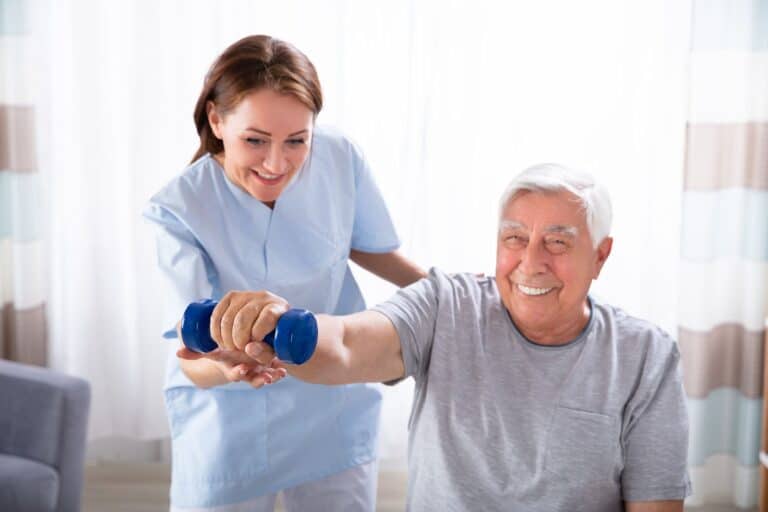For your loved one with Parkinson’s disease, managing his disease and the side effects of it is an important part of his care and helping him live better with the disease. Maintaining a regular exercise program is one of the more important steps he can take to manage his disease. A Parkinson’s care provider can encourage your loved one while ensuring what your loved one is doing is safe.
Why Exercise is Important for Parkinson’s Patients
Exercise and being active is important for everyone and while it might not be the first thing you think of when you think about caring for a loved one with Parkinson’s disease, it is an integral part of helping him manage his disease and continue to be active.
Four Benefits of Regular Exercise for Those with Parkinson’s Disease
Improved gait and balance. Many individuals with Parkinson’s Disease and their loved ones worry about them stumbling or falling when they try to get around. Regular exercise builds muscles and core strength to help prevent stumbles when the body decides to freeze or not move in the direction it desires.
Greater endurance. Moving and being active can be exhausting for someone with Parkinson’s disease, causing them to want to stay in one place and not physically exert themselves. Having greater endurance for activity means they’ll be more active, which in turn, creates better endurance. It’s a good vicious circle.
Better concentration and attention. Regular aerobic exercise lessens the age-related changes to the executive thinking process, helping your loved one to stay mentally sharp.
Reduced depression and anxiety. Having a progressive, chronic disease is hard on everyone mentally. Being active provides endorphins and other key chemicals to the brain to help keep spirits up even in the most trying of times.
Exercising Tips
For your loved one, an exercise program should be first discussed and reviewed with his primary caregiver to ensure that it’s the best course for your loved one. His primary care provider may suggest he have someone come to the home who specializes in Parkinson’s care at home to supervise and assist in an exercise program. A Parkinson’s care provider can encourage your loved one while ensuring what your loved one is doing is safe.
Once the plan is determined and someone is ready to provide Parkison’s care, your loved one should consider these tips to help him be successful and consistent in his exercise routine.
Choose an activity or two to three that he likes. The key is to avoid boredom and the desire to stop exercising because it doesn’t spark interest anymore. For some people, that’s finding the one thing they love. For others, it’s breaking up the exercise routine with several different activities.

Make exercise a challenge. Your loved one should feel like he’s working out by increasing his heart rate and feeling tired afterward. The harder he works out (safely), the stronger his body will become.
Don’t forget to warm up and cool down. Stretching, warming up, staying hydrated, and not getting overly heated are all aspects of exercising that need to be maintained to have a great workout from start to finish.
Listen to his body. Only your loved one will truly know his limits. He must listen to his body when it says it’s time to quit.
Have support. Friends, family, and providers who help with Parkinson’s care at home, can all be great supporters that will keep him motivated and encouraged.
If you or an aging loved one is considering Parkinson’s Care Services in Catonsville MD, please get in touch with the caring staff at Vital Sign Home Care today. (410) 814-0258
A Trusted Skilled Medical and Non-Medical senior home care provider in Baltimore, Annapolis, Arnold, Severn, Guilford, Towson, Brooklandville, Catonsville, Cockeysville, Bel Air, Ellicott City, Columbia MD, and surrounding areas.
Venus had a stroke in 2018, she had no movement on the right side of her body and was unable to speak. Venus has made great progress since then and shows up everyday doing her best. She takes pride in overcoming obstacles and never giving up, which has allowed her to obtain a level of success in healthcare.
- Managing Chronic Pancreatitis Symptoms - November 20, 2024
- Tips for Exercising with Parkinson’s Disease - November 5, 2024
- What to Know About Senior Self-Care Products - October 17, 2024

